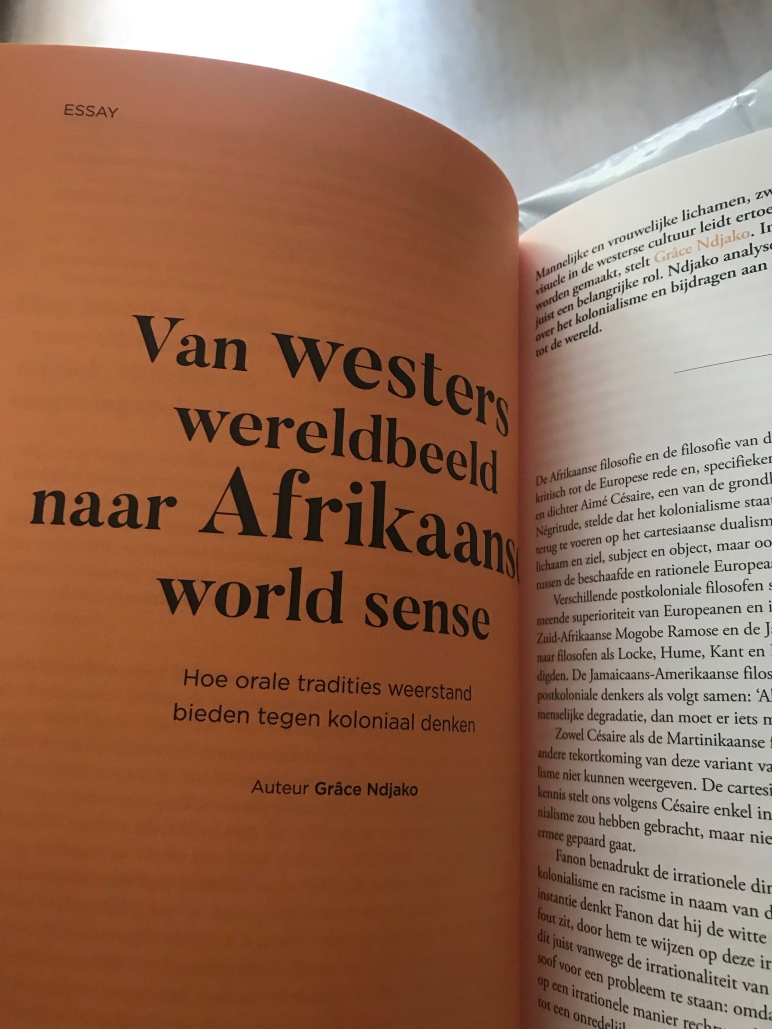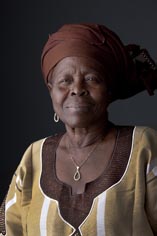Based on a lecture given in the Singelkerk on 24/05/2017
The idea of an African philosophy is still controversial with many within Academia denying its existence and/or its possibility to exist. The debate surrounding its existence is, as stated by Kenyan philosopher Masolo, defined by Western discourse on Africa and the African response (Masolo 1994).
Many have denied the existence of an African philosophy, starting with Hegel. Hegel calls Africa the land of childhood and adds “In Negro life the characteristic point is the fact that consciousness has not yet attained to the realization of any substantial objective existence. […] The African is natural man in his completely wild and untamed state”. This means that Africa is ahistorical, outside of history, and doesn’t have morality, religion or political institutions. The Eurocentrism in his thinking consists of a refusal to attribute a developed consciousness to ‘the other’, in this case Africans.
This thinking of Hegel concerning African philosophy is still present, even among Africans themselves. So the problem also arises from within. As the idea is that the Western type of philosophy is a human universal, this idea has affected many African thinkers. So that modern African thought has focused not on difference from the West but on sameness with the West. As the Nigerian sociologist Oyeronke Oyewumi notes “The problem is that many African writers have assumed Western manifestations of the human condition to be the human condition itself “(Oyewumi 1997).
And thus the question arises as to which conditions an authentic African thought can arise which will incorporate African discourses. As Congolese philosopher Valentin-Yves Mudime asserts, to fully escape, fully decolonize, from the West, we need to know what it means to detach ourselves from it, to know till where, how far the West has reached us.
“’Echapper réellement à l’Occident suppose d’apprécier exactement ce qu’il en coûte de se détacher de lui ; cela suppose de savoir jusqu’où l’Occident, insidieusement peut-être, s’est approché de nous (Mudimbe 1982).
Can Africans liberate themselves? It seems that the West is indispensable, essential. Europe seems to be a mediator in every African philosophical endeavor. Africa seems to be locked in an embrace with the West. According to Nigerian sociologist Oyewumi, the challenge lies in how to extricate ourselves and how much one needs to do so. This problem is fundamental because without this loosening we will continue to mistake the West for the Self and Africans will therefore continue to see themselves as the Other. However this has proven to be difficult as multiple attempts have been made to achieve an authentic African philosophy, and yet each time it was proven how big an impact the West has had on African culture and thought.
Négritude
There was the Négritude movement, developed during the 1930’s, which sought to fight the alienation that had occurred during colonial rule. It’s a regaining of consciousness of African culture. “A concrete rather than an abstract coming to consciousness” as Aimé Césaire, one of the founders, put it. Negritude can be further characterized as “the affirmation of the distinctiveness of African cultural values, the confirmation of the being of the African”(Gbadegesin 1991).
But the movement has its origin in surrealism and existentialism. They interpreted surrealism as a disalienation and applied it to their particular situation (Césaire 2000). They were also heavily influenced by Husserl’s phenomenology and Heidegger’s existentialism. Furthermore, they rejected rationalism and claimed that the African has an intuitive reason and emotive capacity, which is a claim proposed by European colonist.
Fanon : One needs to reinvent oneself
“Il faut faire peau neuve, développer une pensée neuve”, is what Frantz Fanon wrote in ‘Les damnés de la terre’. One needs to reinvent oneself, develop a new way of thinking. He thought that a complete tabula rasa was necessary. Former colonies should not aspire to become a copy of Europe, in that case one could have let them rule the continent. Which is why he states that Africa should reinvent itself, develop a new thinking. One could describe Fanon as an existentialist as he draws a large part of his philosophical thought from the concreteness and applicability of personal experience. Also he was heavily influenced by Sartre, notably his ‘reflections on the Jewish question’. The freedom he describes, is a freedom in the Sartrean sense, in which man creates himself, freedom is the basic presupposition of authentic expression and action (Masolo 1994).
Ethnophilosophers are thinkers such as Alexis Kagame, John Mbiti, Placide Tempels and one might also include Léopold Senghor. They view African Philosophy as the philosophical thought of traditional Africans (Gbadegesin 1991). These thinkers are criticized for merely exposing a worldview. Kagame in particular is criticized for being too Aristotelian, he rests his exposition on the assumption of similarities in thinking between the ancient Greek philosophers and the Bantu people. He uses Aristotelian metaphysical categories and imposes them on Bantu languages. His work can thus be seen as Western philosophy examining the African situation.
Mudimbe : Social reality is a construct
The question Valentin-Yves Mudimbe asks in his work is: “Does this mean that African Weltanschauungen and African traditional systems of thought are unthinkable and cannot be made explicit within the framework of their own rationality?” ( Mudimbe 1988). He noted that it was important for African thinkers to not just be African but also that their works are based on African sources and themes.
But in his own work Foucault is present everywhere, notably his idea that social reality is a construct and his ‘archaelogy of knowledge’. He also relies on Levi-Strauss and his notion of the ‘savage mind’.
So at each time we see that Europe seems to be a condition to the development of an authentic form of thought, even though the goal was to distance oneself from Europe.
‘Professional philosophers’
And so other philosophers, such as Wiredu, Towa and Houtondji have tried to deny the existence of an authentic African philosophy and have claimed that African philosophy needs to be rooted in the European tradition. Wiredu states that:
“Philosophy must have the same meaning in all cultures although the subjects that receive priority, may be dictated by cultural biases” (Bodunrin 1981).
As such African philosophy will just be the philosophical work of any African philosopher, even if they study Plato. Wiredu upholds that African philosophers have no choice but to conduct their philosophical inquiries in relation to the philosophical writings of Western philosophers as they have no heritage of philosophical writings. Furthermore he claims that it is in the West that modern developments in human knowledge have gone farthest and where philosophy is in closest touch with conditions of the modernization (Wiredu 1980).
Their position is Eurocentric as Europe is uphold as a measure and is seen as the center of reason, true humanity and objectivity.
According to Oyewùmí Modern African thought has focused not on difference from the West but on sameness with the West. It is precisely because African intellectuals accept and identify so much with European thinking that they have created African versions of Western things. They seem to think that the European mind-set is universal and that therefore, since Europeans have discovered the way the world works and have laid the foundations of thought, all that Africans need to do is to ad their own ‘burnt’ bricks on top of the foundation. (Oyewumi 1997).
“Western theories become tools of hegemony as they are applied universally, on the assumption that Western experiences define the human” (Oyewumi 1997).
The issue of Language
What makes researching African thought so difficult is that many researchers have difficulty writing in and understanding indigenous languages. One cannot easily separate culture from language. Culture reflects the world in images, and through those images conditions a person to see the world in a certain way. Colonial education replaced African traditional principles with foreign ones and it cut their intellectuals from their base (Oluwole 1997).
The writers of the Négritude all expressed themselves in the French language, as do, Fanon and Mudimbe. And the thinkers from the former English colonies express themselves in English. And so the conceptual frameworks embedded in foreign philosophical traditions have been assimilated by these thinkers.
Gyekye
Ghanaian philosopher Kwame Gyekye pays attention to the problem of language in African thought. It is the job of the African philosopher to explicit, reflect on and interpret the concepts in African thought. Language suggests a philosophical perspective. Modern African philosophy needs to have its roots in African experience, cultural values and thought categories and reflect it. Only then can it be called African philosophy.
“If a philosophy produced by a modern African has no basis in the culture and experience of African peoples, then it cannot appropriately claim to be an African philosophy, even though it was created by an African philosopher” (Gyekye 1995).
As such he disagrees with Hountondji and Wiredu when they say that African philosophy is any philosophical work produced by an African. If an African philosopher researches a Western philosophy, he contributes to our understanding of Western philosophy and not to a better understanding of African thought.
As a philosopher he wants to establish the conceptual scheme of African peoples, in his case the Akan, by analyzing and reflecting on proverbs. Though the question one could ask is whether or not African philosophy needs to be systematic or if this is influenced by Western ideas on philosophy and modeled after their philosophical systems.
Intellectual culture – Oluwole
So wherein lies the possible solution? Nigerian philosopher Sophie Oluwole highlights the importance of the intellectual culture. African philosophy depends on the existence of an African intellectual culture, these are the basic principles that underlie thought. Being intellectually cultured means one is rationally and factually enlightened in thought. And as she asserts
“while philosophy as a discipline does not necessarily coincide with the principles of a people’s intellectual culture, it does pay homage to the latter. This is so since an intellectual culture necessarily underlies every rational endeavor carried out under its influence” (Oluwole 1997).
The search for an intellectual culture and philosophy should not mean a revisiting of old values and perceptions. Rather the argument is that we will never have valid grounds for comparing African thoughts with Western thoughts alternatives if we fail to grasp the basic principles under whose guidance African intellectuals operated (Oluwole 1997).Those fundamental principles can be found in old values, proverbs and perceptions. As such this means that the task lies in identifying the basic assumption of African conceptual frameworks.
© Grâce Ndjako
Sources:
- Césaire, Aimé (2000) « Discourse On Colonialism »,
- Fanon, Frantz. (2002) “Les Damnés de la terre »
- Gbadegesin, Segun. (1991) « African Philosophy »
- Gyekye, Kwame. (1995) “African Philosophical Thought”
- Hegel, Georg. (1956) “The Philosophy of History”
- Masolo, D.A. (1994) “African philosophy, in search of identity”,
- Mudimbe, Valentin-Yves. (1982) “L’odeur du Père”
- Mudimbe, Valentin-Yves. (1988) “The Invention of Africa”
- Oyewumi, Oyeronke. (1997) “The Invention of Women”
- Wiredu, Kwasi. (1980) “Philosophy and an African culture”




